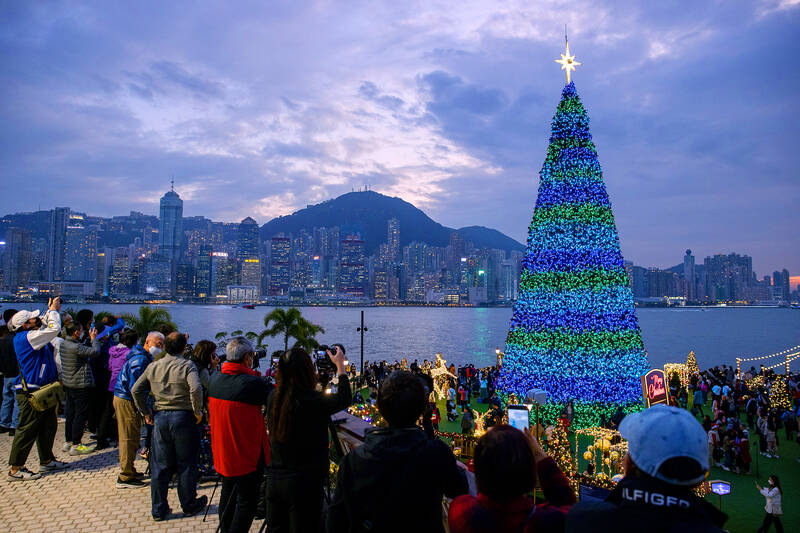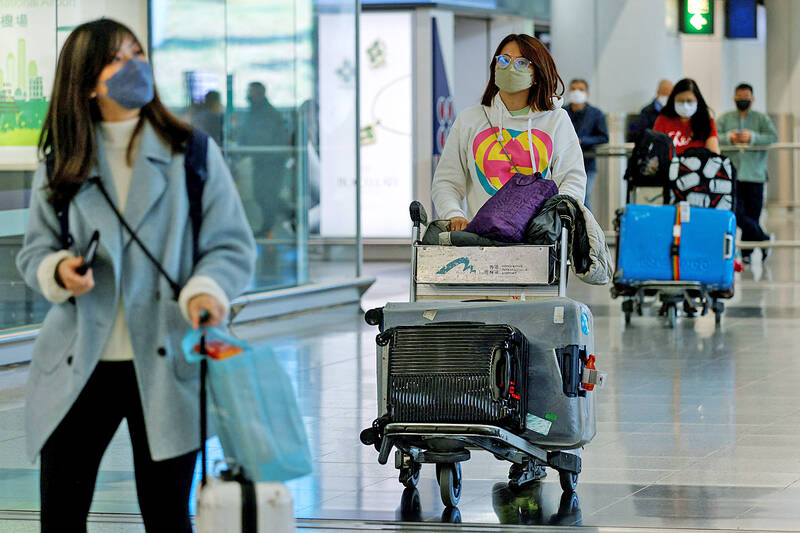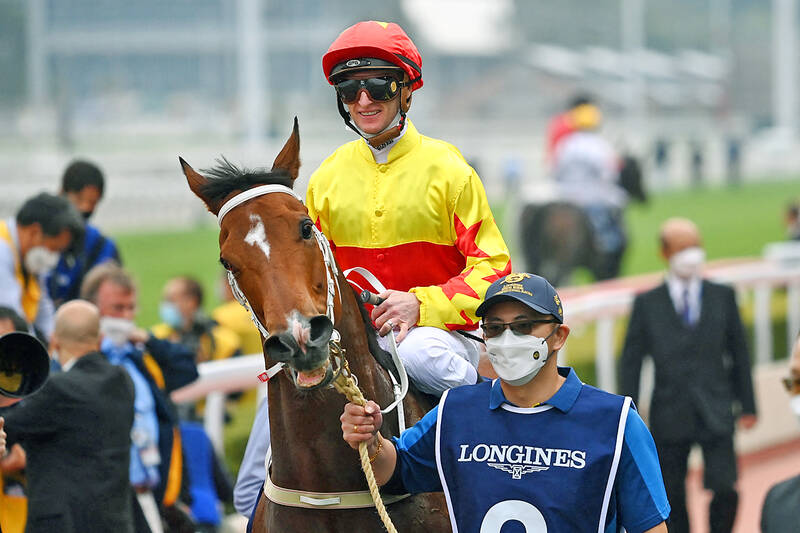The beer is flowing again at Hong Kong’s Happy Valley Racecourse. Music pumps from clubs in the neon-streaked Lan Kwai Fong district. Even the Sevens — the annual rugby extravaganza that’s captured this city’s hyperkinetic lifestyle for decades — is back, finally.
After more than two years under Beijing’s stringent pandemic rules, Hong Kong wants to prove that it can still be “Asia’s World City.”
The Hang Seng Index has found a footing after losing roughly half its value. Dealmakers say business is looking up at last.

Photo: EPA-EFE
But behind the hopeful signs are some hard realities. As the pandemic recedes, a new Hong Kong is emerging — one that’s less free, less cosmopolitan and, for some businesses, less vital than the old one.
Since 2020, tens of thousands of people have left. Among them are scores of bankers, lawyers and other professionals who’ve traditionally helped to make this a freewheeling, international entrepot. As of June, the city’s population had fallen by about 216,000, or 2.8 percent, to 7.3 million.
Meantime, more than 60 international companies have moved their regional headquarters out of Hong Kong. Just over a third of 36 fund management companies surveyed in July had shifted regional or global posts from the city. New visas for foreign financial services workers fell 50 percent to 1,894 in the first nine months of this year compared with three years ago, according to government data.

Photo: Reuters
The pandemic — and Beijing’s strict policies to deal with it — are only part of the story. A quarter-century after Hong Kong’s return to China, Hong Kong’s rulers have chipped away at civil liberties and jailed dozens of pro-democracy figures. On Dec. 10, media mogul Jimmy Lai (黎智英) was sentenced to more than five years in prison for fraud, a punishment human-rights activists decried as a blow to freedom of expression.
Even in the financial community, an impolitic word can now draw a sharp rebuke from official Beijing. Anxiety is growing. One British national who worked in finance recalled deleting WhatsApp and Signal messages that could be deemed seditious before a routine meeting with local police. His concern: authorities might check his phone. In August, he moved to Singapore.
“It’s hard not to imagine that international business won’t take note of the downward trend in Hong Kong’s autonomy, and continue to assess their presence in Hong Kong accordingly,” said Thomas Kellogg, executive director of the Georgetown Center for Asian Law.

Photo: AFP
Despite the buoyant stock market, life is hardly back to pre-pandemic normal. Visitors still need to do multiple mandatory COVID tests. Masks must be worn in public places. The border with mainland China remains closed.
And the local economy, like the rest of China’s, is hurting. The government projects gross domestic product will have shrunk 3.2 percent this year, its third contraction in four years. Home prices have tumbled 18 percent from last year’s peak, and Goldman Sachs Group Inc predicts the slump will only get worse.
The hotel industry, which was hit particularly hard by COVID, is struggling to lure workers back.
“We have seen a mass outflow of talent,” Aron Harilela, chairman of Harilela Hotels, said at a briefing to industry professionals and the media in late October. Attracting employees is a “mammoth task,” he said.
“I think the fear and stigma that we have been facing about COVID, where the rest of the world has not been facing, has been stifling us,” Harilela said.
Hong Kong’s Beijing-picked leader, John Lee (李家超), has been trying to burnish the city’s sullied reputation as an international business hub. A big step: rolling back COVID restrictions, including mandatory hotel quarantine. Lee also plans to relax visa rules and reduce the stamp duty on property purchases by non-residents. On Tuesday he scrapped most of the remaining curbs. The reopening of the border with mainland China is expected early next year.
Travelers are returning. Average daily arrivals at Hong Kong International Airport have jumped to about 20,000 from a low of just under 70 in March, according to the Immigration Department, which doesn’t provide data for the pre-pandemic period.
Executive recruiters, who have an interest in luring people back, are predictably optimistic. They say Hong Kong’s long-time selling points — low taxes, good opportunities and access to lucrative mainland markets — are still big draws. It helps that the city’s notoriously high housing costs have fallen.
“I’ve seen a lot of interest from people, particularly expats who left to Europe or London,” said Loretta Chan, Hong Kong-based partner at executive search firm Wellesley Partners, which focuses on the financial services industry. “I’ve seen them come back.”
Alan Schmoll says he’s considering moving back. The former banker lived here from 2009 to 2014. Now based in Melbourne, he visited in November for business and for the Hong Kong Sevens.
The trip, Schmoll says, was a success all around. He got a lot of business done, and partied a bit too much at Boomerang, a club in Lan Kwai Fong, after a COVID test at the door.
“The club was packed,” said Schmoll, who runs an online real estate company. “It was B.A.U. — business as usual.”

The Democratic Progressive Party (DPP), Chinese Nationalist Party (KMT), and the country’s other political groups dare not offend religious groups, says Chen Lih-ming (陳立民), founder of the Taiwan Anti-Religion Alliance (台灣反宗教者聯盟). “It’s the same in other democracies, of course, but because political struggles in Taiwan are extraordinarily fierce, you’ll see candidates visiting several temples each day ahead of elections. That adds impetus to religion here,” says the retired college lecturer. In Japan’s most recent election, the Liberal Democratic Party lost many votes because of its ties to the Unification Church (“the Moonies”). Chen contrasts the progress made by anti-religion movements in

Taiwan doesn’t have a lot of railways, but its network has plenty of history. The government-owned entity that last year became the Taiwan Railway Corp (TRC) has been operating trains since 1891. During the 1895-1945 period of Japanese rule, the colonial government made huge investments in rail infrastructure. The northern port city of Keelung was connected to Kaohsiung in the south. New lines appeared in Pingtung, Yilan and the Hualien-Taitung region. Railway enthusiasts exploring Taiwan will find plenty to amuse themselves. Taipei will soon gain its second rail-themed museum. Elsewhere there’s a number of endearing branch lines and rolling-stock collections, some

Last week the State Department made several small changes to its Web information on Taiwan. First, it removed a statement saying that the US “does not support Taiwan independence.” The current statement now reads: “We oppose any unilateral changes to the status quo from either side. We expect cross-strait differences to be resolved by peaceful means, free from coercion, in a manner acceptable to the people on both sides of the Strait.” In 2022 the administration of Joe Biden also removed that verbiage, but after a month of pressure from the People’s Republic of China (PRC), reinstated it. The American

This was not supposed to be an election year. The local media is billing it as the “2025 great recall era” (2025大罷免時代) or the “2025 great recall wave” (2025大罷免潮), with many now just shortening it to “great recall.” As of this writing the number of campaigns that have submitted the requisite one percent of eligible voters signatures in legislative districts is 51 — 35 targeting Chinese Nationalist Party (KMT) caucus lawmakers and 16 targeting Democratic Progressive Party (DPP) lawmakers. The pan-green side has more as they started earlier. Many recall campaigns are billing themselves as “Winter Bluebirds” after the “Bluebird Action”